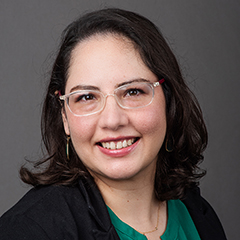Silvia Robles is passionate about understanding and mitigating social inequality and expanding the knowledge base of programs and policies that improve public well-being. Recently, her research focuses on diversifying access to selective universities; science, technology, engineering, and mathematics (STEM) majors; and STEM careers for underrepresented populations, including people from low-income and minority backgrounds. She is currently the deputy project director for a National Science Foundation study evaluating their ADVANCE program, which seeks to systemically improve the conditions of women and racial and ethnic minority populations in STEM academic careers.
Robles brings expertise in the economics of education, causal evaluation methods, and data analysis to the projects she works on. Since joining Mathematica in 2019, she has worked as a quantitative analysis researcher on several large, complex studies including an experimental evaluation for the U.S. Department of Education examining video-based coaching for teachers, and an evaluation of the Gates Foundation’s Networks for School Improvement Initiative. This initiative supports school networks in using continuous improvement processes to improve high school and postsecondary outcomes for students who are Black, Latino, or experiencing poverty. She also worked on several quasi-experimental evaluations for various foundations, including as a project director for the Cleveland Foundation’s comparative study of enrollment and effectiveness among traditional, non-traditional, and charter schools in a midwestern school district.
Robles holds a Ph.D. in economics from Harvard University and was a postdoctoral fellow at the Ford School of Public Policy, University of Michigan. Her research has been published in the Journal of Public Economics and the AEA Papers and Proceedings. Before pursuing her doctoral degree, Robles worked as a project associate at Innovations for Poverty Action.


